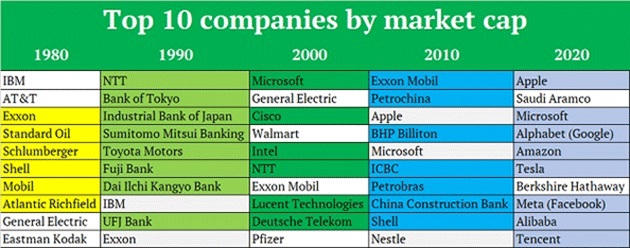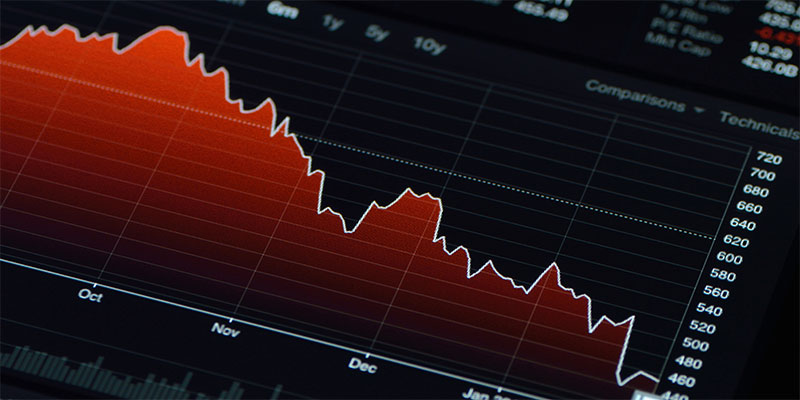- “This marks the end of the big tech trade.”
My friend who runs a hedge fund told me that over lunch in London last week.
Every year since at least 2015, many have “called” the end of the big tech trade. Yet, Apple (AAPL)… Amazon (AMZN)… Google (GOOG)… Facebook (META)… and Microsoft (MSFT) just kept marching higher.
Rising stock prices only reinforced the idea that these were the best, most innovative companies on the planet.
You often need a “catalyst” to spark change. My buddy and I think Google’s artificial intelligence (AI) calamity is the moment investors finally realize big tech is past its “sell by date.”
It’s not just Google. Apple sank $10 billion into a self-driving car it never built. It didn’t even get as far as testing a prototype on the road. From the company that pioneered the iPod and iPhone, that’s embarrassing.
More and more folks are realizing what you and I already knew: These companies are no longer nimble disruptors.
Longtime readers will recognize this table. It shows the world’s largest companies by decade since the beginning of 1980.
You’ll notice two things:
#1: Each decade has a dominant theme.
#2: The Top 10 completely changes every decade.
 Source: companiesmarketcap
Source: companiesmarketcap
Expect this list to look a lot different in a few years.
We should celebrate this changing of the guard. It’s healthy and it means new innovative companies are flourishing.
Avoid Apple and Google. Instead, buy great businesses profiting from megatrends that could make the list in 2030.
- This AI killer must be stopped.
Europe just signed the “AI Act” into law. It’s a sweeping new set of AI regulations.
The rules are vague by design but include banning AIs that pose a “risk to fundamental rights.” AIs used in education and healthcare will face strict oversight.
It’s obvious where this is going: The AI Act will lead to the banning of cutting-edge AIs in Europe. We’re already seeing it with Anthropic’s new Claude 3 system, which is blocked here.
AI has the potential to transform our lives. It’s already creating personalized tutors that turn our kids into straight-A students. It’s developing lifesaving drugs at warp-speed, too.
It can also create trillions of dollars in wealth for companies and investors.
But if bureaucrats smother AI in its crib, forget about progress. Innovation will be replaced with endless ethics committees.
These kinds of developments test my optimism. I don’t believe the future will automatically be better than the present. That’s complacency.
I’m optimistic for one specific reason: I believe entrepreneurs and innovators will continue to improve the world, as they have the last 200 years.
The human mind invented ways to pull power from the sun… “delete” diseases from our bodies… make sand “think” (AI chips come from sand)… and put a man on the moon.
Our future can be unrecognizably great, but not if we outlaw innovation with silly rules.
Just look at heavily regulated industries like healthcare and education. Every industry the government touches turns to stone. Progress stagnates, while costs balloon.
Today, we have a small window to fight for AI innovation. If the crackdown takes hold—like with nuclear energy in the '70s—it becomes near impossible to undo.
What we should do: Treat AI like the internet.
The web has been the greatest disruptive trend of our lifetimes because the government largely left it alone.
Even when regulators enacted internet laws in the mid-'90s, they took a hands-off approach.
Imagine if politicians had drafted a 500-page “Internet Act” just as the web was ramping up.
You couldn’t have predicted Airbnb (ABNB) or Uber (UBER) in the early '90s. So, how could you pass laws to regulate them? The “Internet Act” would have enforced some silly rules killing these companies before they were even born.
Time to speak up and fight for the incredible benefits AI can bring.
- Today’s dose of optimism…
Cystic fibrosis (CF) was once a death sentence.
Most babies born with CF 100 years ago died in infancy. Even by the 1970s, the average life expectancy was 10.
Then scientists invented Trikafta. Kids with CF who take the drug today are expected to live past 80, on average. That’s a normal life span!
Being diagnosed with HIV 30 years ago all but guaranteed early death. Then doctors invented a concoction of drugs that turned it into a manageable disease.
Technology and innovation—not bureaucracy—are why we’re living healthier, happier, longer lives than ever before.
I’ll chat with you Monday.
Stephen McBride
Chief Analyst, RiskHedge



